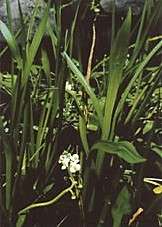Sagittaria sanfordii
| Sagittaria sanfordii | |
|---|---|
 | |
| Scientific classification | |
| Kingdom: | Plantae |
| (unranked): | Angiosperms |
| (unranked): | Monocots |
| Order: | Alismatales |
| Family: | Alismataceae |
| Genus: | Sagittaria |
| Species: | S. sanfordii |
| Binomial name | |
| Sagittaria sanfordii Greene | |
Sagittaria sanfordii is an uncommon species of flowering plant in the water plantain family known by the common names valley arrowhead[1] and Sanford's arrowhead. It is endemic to California, where it is known from a few scattered occurrences on the North Coast and in the Central Valley. Many occurrences previously noted in the Central Valley and in southern California have been extirpated as the plant's aquatic habitat has been lost to human activity.[2][3]
Sagittaria sanfordiiis an aquatic perennial herb up to 130 cm tall, growing from a spherical tuber. The leaves are very often submerged, variable in shape, usually long and strap-shaped or narrowly lanceolate. Leaves may grow up to 25 centimeters long from the underwater stem. The plant is monoecious, with individuals bearing both male and female flowers. The inflorescence which rises above the surface of the water is a raceme made up of several whorls of flowers, the lowest node bearing female flowers and upper nodes bearing male flowers. The flower is up to 3.5 centimeters wide with white petals. The male flowers have rings of stamens at the centers. Female flowers each have a spherical cluster of pistils which develops into a head of tiny fruits.[3][4][5]
References
- ↑ "Sagittaria sanfordii". Natural Resources Conservation Service PLANTS Database. USDA. Retrieved 26 October 2015.
- ↑ California Native Plant Society Rare Plant Profile
- 1 2 Flora of North America v 22, Sagittaria sanfordii
- ↑ Greene, Edward Lee. 1890. Pittonia 2(9): 158, Sagittaria sanfordii
- ↑ Hickman, J. C. 1993. The Jepson Manual: Higher Plants of California 1–1400. University of California Press, Berkeley.